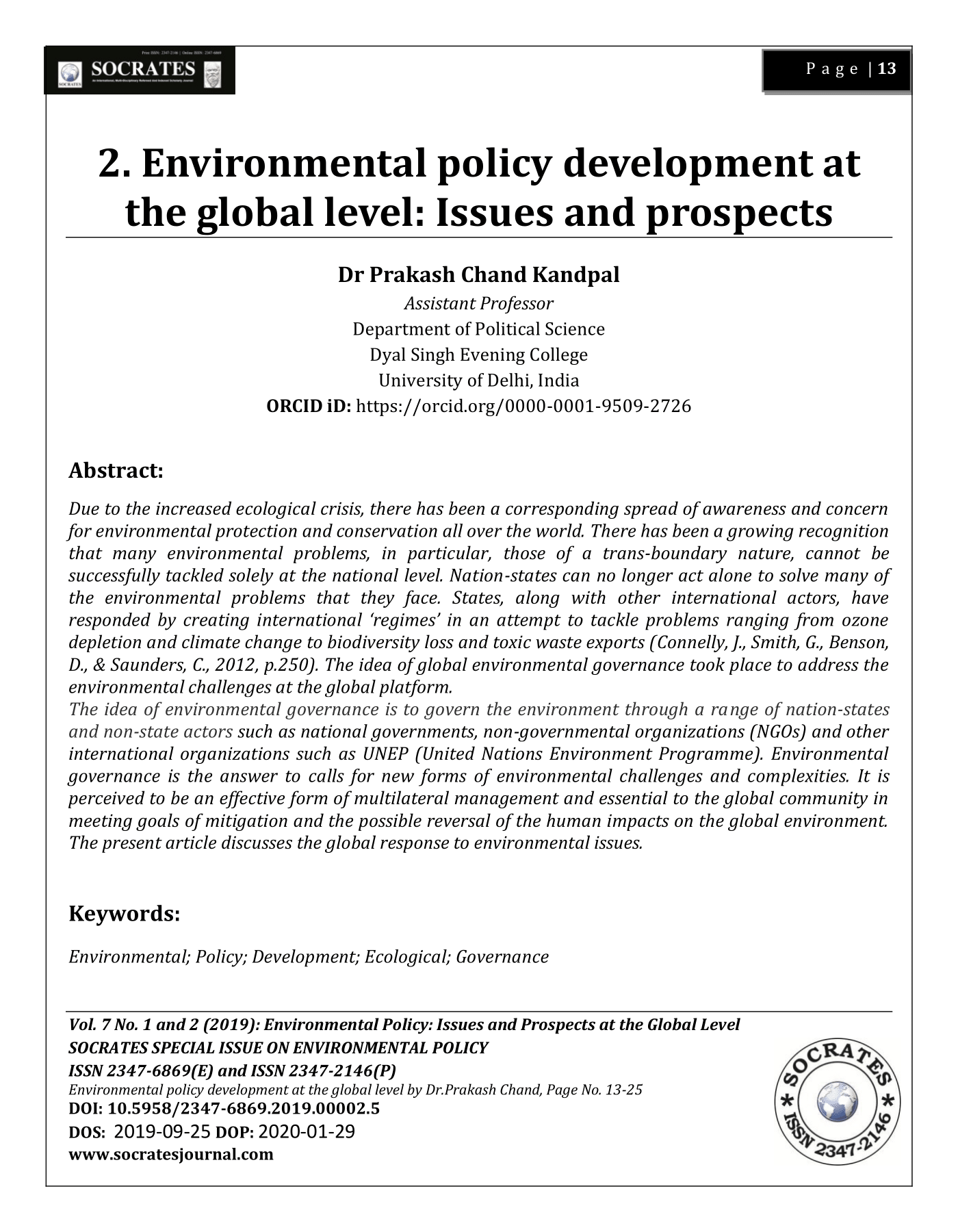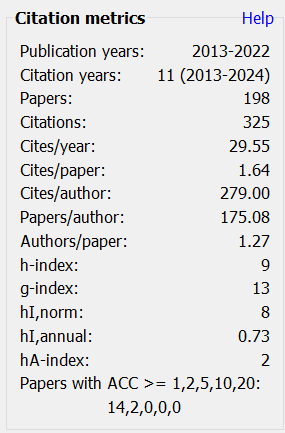Environmental policy development at the global level
Issues and prospects
DOI:
https://doi.org/10.5958/2347-6869.2019.00002.5Keywords:
Environmental, Policy, Development, Ecological, GovernanceAbstract
Due to the increased ecological crisis, there has been a corresponding spread of awareness and concern for environmental protection and conservation all over the world. There has been a growing recognition that many environmental problems, in particular, those of a trans-boundary nature, cannot be successfully tackled solely at the national level. Nation-states can no longer act alone to solve many of the environmental problems that they face. States, along with other international actors, have responded by creating international ‘regimes’ in an attempt to tackle problems ranging from ozone depletion and climate change to biodiversity loss and toxic waste exports (Connelly, J., Smith, G., Benson, D., & Saunders, C., 2012, p.250). The idea of global environmental governance took place to address the environmental challenges at the global platform. The idea of environmental governance is to govern the environment through a range of nation-states and non-state actors such as national governments, non-governmental organizations (NGOs) and other international organizations such as UNEP (United Nations Environment Programme). Environmental governance is the answer to calls for new forms of environmental challenges and complexities. It is perceived to be an effective form of multilateral management and essential to the global community in meeting goals of mitigation and the possible reversal of the human impacts on the global environment. The present article discusses the global response to environmental issues.
DOI: 10.5958/2347-6869.2019.00002.5
Downloads
Metrics
References
ANANTHANARAYAN, B. (2013). Environmental Governance: Appro-aches, Imperatives and Methods. Jayanta.
Baylis, J. (2020). The globalization of world politics: An introduction to international relations. Oxford University Press.
Bookchin, M. (1971). Post-scarcity anarchism (p. 20). Berkeley: Ramparts Press.
Carson, R. (2011). Lost woods: The discovered writing of Rachel Carson. Beacon Press.
Chasek, P. S. (2018). Global environmental politics. Routledge.
Clapp, J., & Dauvergne, P. (2011). Paths to a green world: The political economy of the global environment. MIT press.
Clapp, J., Dauvergne, P., & Maret, S. (2006). Paths to a Green World: The Political Economy of the Global Environment. JOURNAL OF SOCIOLOGY AND SOCIAL WELFARE, 33(4), 209.
Connelly, J., Smith, G., Benson, D., & Saunders, C. (2012). Politics and the environment: from theory to practice. Routledge.
Francioni, F., & Bakker, C. (2013). The evolution of the global environmental system: Trends and prospects (No. 8). Transworld Working Papers.
Goldin, I. (2016). The Pursuit of Development: Economic Growth, Social Change and Ideas. Oxford University Press, p.19
Goldin, I. (2016). The Pursuit of Development: Economic Growth, Social Change and Ideas. Oxford University Press, p.53
Hough, P. (2014). Environmental security: an introduction. Routledge.
Imperatives, S. (1987). Report of the World Commission on Environment and Development: Our common future. Accessed Feb, 10.
Jeffrey, C., & Harriss, J. (2014). Keywords for modern India. OUP Oxford, p.54
Kothari, R. (1976). State and nation building (Vol. 1). Asia Book Corp of Amer, p.3
Kothari, R. (1976). State and nation building (Vol. 1). Asia Book Corp of Amer, p.2
Lowenthal, D. (2009). George Perkins Marsh: prophet of conservation. University of Washington Press.
Najam, A. (2005). Why environmental politics looks different from the South. Handbook of global environmental politics, p.119
Perkins Marsh, G. (1864). Man and Nature or Physical Geography as Modified by Human Action.
Pisano, U., Endl, A., & Berger, G. (2012). The Rio+ 20 Conference 2012: Objectives, processes and outcomes. ESDN Quarterly Report, 25.
Speth, J. G., & Haas, P. M. (2007). Global environmental governance. Pearson Education India.
Von Schirnding, Y. (2005). The World Summit on Sustainable Development: reaffirming the centrality of health. Globalization and Health, 1(1), 8.
Ward, B., & Dubos, R. (1972). Only one earth. The care and maintenance of a small planet. Harmondsworth: Penguin Books Ltd.
Wilkinson, R., & Hughes, S. (Eds.). (2002). Global governance: Critical perspectives. Psychology Press.
Williams, M. (1993). Re‐articulating the third world coalition: the role of the environmental agenda. Third World Quarterly, 14(1), 7-29.

Downloads
Published
How to Cite
Issue
Section
Categories
License
Copyright (c) 2020 Chand Prakash

This work is licensed under a Creative Commons Attribution-NonCommercial 4.0 International License.
Revised Copyright/CC license that applies to all the articles published after 05-02-2017
Attribution-NonCommercial 4.0 International (CC BY-NC 4.0)

Copyright/CC license that applies to all the articles published before 05-02-2017
Attribution-Non Commercial-No Derivatives 4.0 International (CC BY-NC-ND 4.0)

Author(s) will retain all the right except commercial and re-publishing rights. In the case of re-publishing, they will have to obtain written permission from the journal. Additional licensing agreements (Creative Commons licenses) grants rights to readers to copy, distribute, display and perform the work as long as you give the original author(s) credit, they can not use the works for commercial purposes and are not allowed to alter, transform, or build upon the work. For any reuse or distribution, readers and users must make clear to others the license terms of this work. Any of these conditions can be waived if you get permission from the copyright holders. Nothing in this license impairs or restricts the authors’ rights. To view a copy of this license, visit http://creativecommons.org/licenses/by-nc-nd/4.0/ or send a letter to Creative Commons, 171 Second Street, Suite 300, San Francisco, California, 94105, USA.
Research Papers published in SOCRATES are licensed under an Attribution-NonCommercial-NoDerivatives 4.0 International (CC BY-NC-ND 4.0)
















